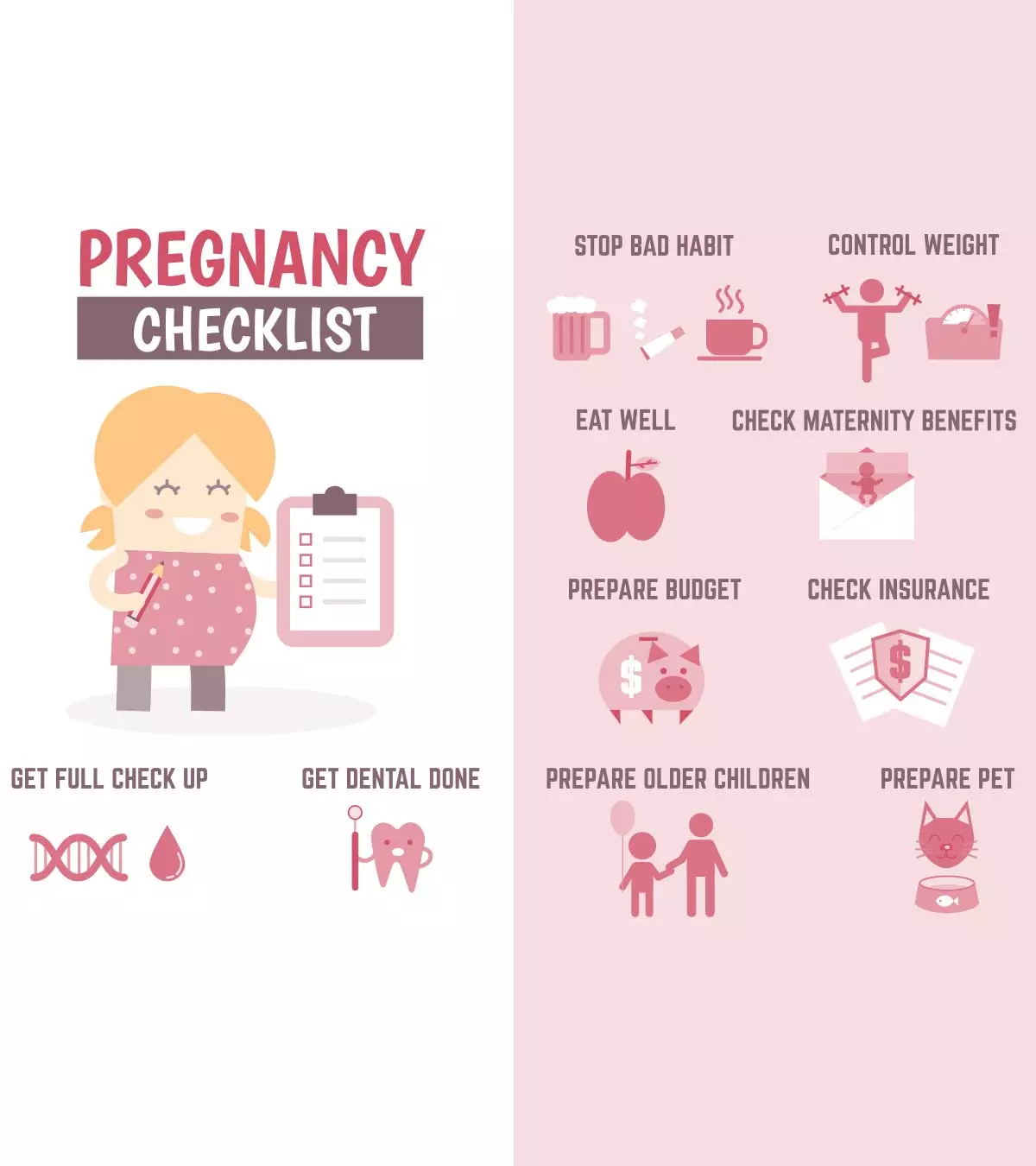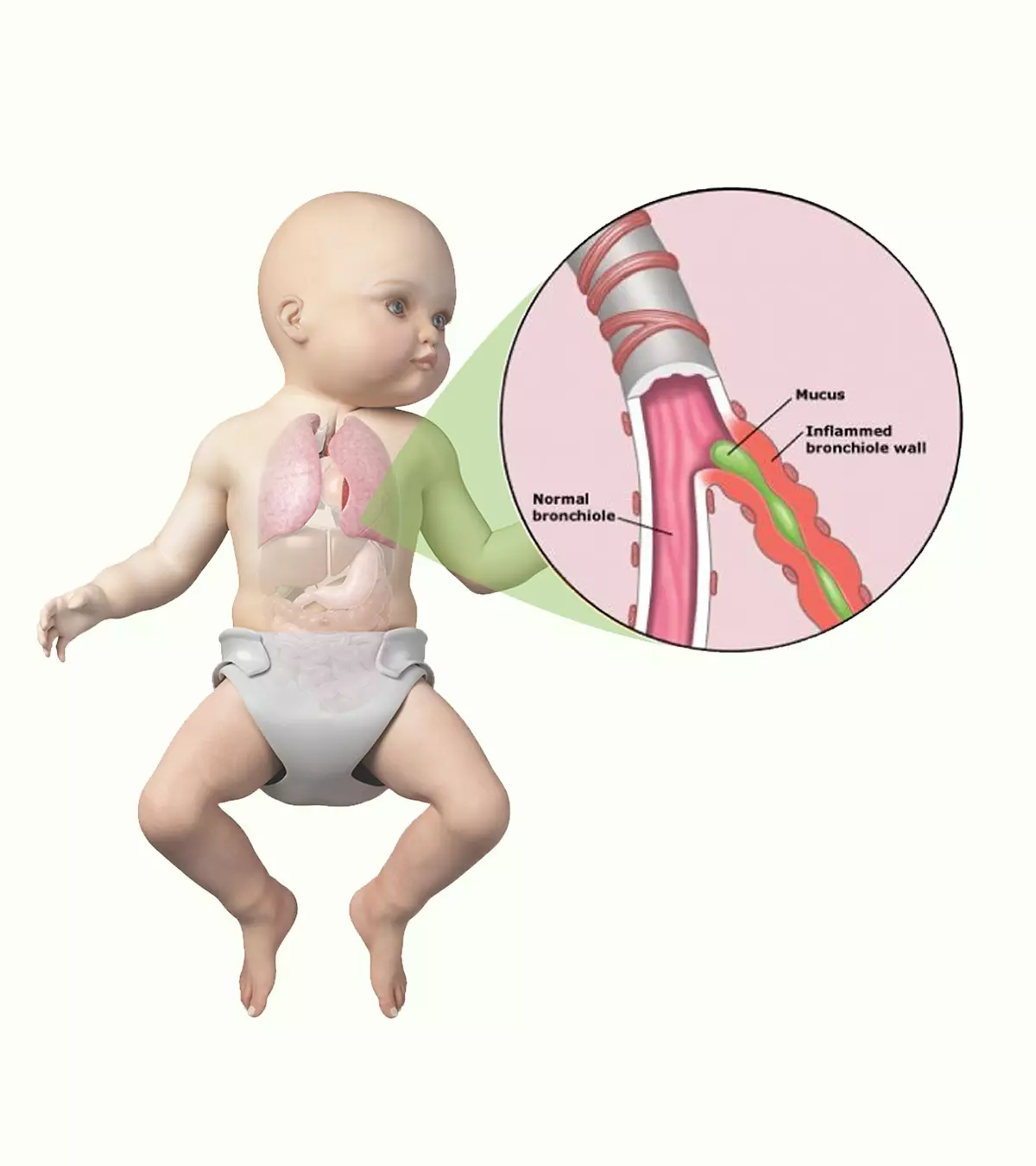

Image: Shutterstock
Knowing the do’s and don’ts when pregnant can help you have a safer pregnancy. Expecting mothers should be careful when engaging in activities they previously considered safe since their bodies are undergoing several physiological and psychological changes.
Although it may be overwhelming to receive a lot of new information, knowing the right and safe choices could help you avoid worries later. Further, doctors may give personalized recommendations during your prenatal visits in each trimester. Note that the dos and don’ts are specific to the trimester.
Read on to know more about the dos and don’ts when pregnant and why it is important to follow them.
Things To Avoid During Pregnancy
There are many things you can’t do while pregnant, for your baby’s safety and good health.
- Do not eat raw meat, unpasteurized dairy, raw foods, fried foods, etc. They may contain harmful microbes that can adversely affect you and your baby’s health (1). Such foods also contribute to excessive weight gain. When you are eating raw fruits and vegetables, make sure that you are washing them thoroughly before consumption.
- Do not paint the nursery as the chemicals and solvents in the paints can be toxic and harmful (2). If you want to paint the nursery, then you can use natural or organic colors, and ensure the room is well-ventilated.
- Do not go overboard on caffeine. It can increase blood pressure, heart rate, and you have to go frequently to the loo. Also, caffeine passes through the placenta to the fetus (3). It is also associated with an increased risk of low birth weight and birth defects (4).
- Do not take medications without consulting your health practitioner. Certain medications may have specific dosage and should not be taken over-the-counter (4).
- Do not wear stilettos and prefer heels that are three-inch or less, such as wedges, platforms, and kitten heels. Heels may make you uncomfortable as the body’s center of gravity changes and could therefore result in muscle damage, backache, pelvic pain and loss of balance. If you have swollen ankles, you might feel better in flip-flops (5).
- Do not change the kitten litter as the feces can carry a rare parasitic disease, toxoplasmosis. Even if you do, wear gloves while changing and wash your hands after that (6).
- Do not breathe secondhand smoke. It is linked to many complications including cancers, premature delivery, miscarriage, low birth weight babies, sudden infant death syndrome, and learning or behavioral issues as the baby grows (7).
- Do not take alcohol including wine, liquor, and beer. It can pass through the placenta and umbilical cord and affect the baby’s developing brain and organs. Regular consumption of alcohol might lead to premature birth, brain damage, miscarriage, stillbirth, and a life-long debilitation condition know as fetal alcohol syndrome (8).
- Do not sit or stand for extended periods in the same position. It can hurt the ankles and veins. Take frequent breaks and move around to keep your legs elevated if you have been on your feet for some time (9).
- Do not get carried away by contradictory information given in books, magazines, and online media. Trust your instincts and when in doubt, talk to your practitioner.
- Do not take illegal drugs. Drugs are associated with increased chances of low birth weight babies, impaired neurobehavioral development in babies, birth defects, and withdrawal effects (10).
- Do not eat foods made of unpasteurized dairy products or uncooked/ semi-cooked meat as they possibly carry harmful bacteria listeria that makes you and your baby vulnerable to many diseases (11).
- Do not get in contact with reptiles such as lizards, turtles, iguanas, and snakes. Their feces pass salmonella virus into your system and can be dangerous (12).
- Ensure there are no ticks as their bites can cause Lyme disease. The effects include permanent tooth discoloration in pregnant women and deformation of bones in the fetus (13).
- Avoid vitamin A supplements unless advised by your healthcare practitioner. Having excessive vitamin A can lead to birth defects in the baby (14).
- Stay away from video display terminals (VDTs), radios, high voltage power lines, telegraph transmissions, and various other common appliances and communication equipment. These emit harmful, non-ionizing radiations that may lead to abortions, birth defects, and genetic damages in babies (15). If your work requires you to deal with such equipment, you might use devices that help reduce radiation or seek a change in the nature of work.
- Exposure to X-rays, especially abdominal X-rays, increases the risk of birth defects and cancers such as leukemia in babies later in life (16).
- Do not stay near microwaves, They emit non-ionizing radiation, and exposure to higher levels of these radiations might cause internal body heating. This could, therefore, affect the developing fetus. A damaged microwave oven may also increase the risk of higher energy leaks that could be dangerous (17).
- Do not use an electric blanket. They emit low-level electromagnetic fields, which can be dangerous for the growing fetus (18). Also avoid overheating as this might result in increased core temperature.
- Do not use a waterbed as the heaters used in them emit the same electric fields as electric blankets (19).
- Do not drink tap water in early pregnancy stages if the water in your region is prone to contaminants (20). Have treated water.
- Avoid stress especially at work. It can affect your immune system and increase the chance of infections leading to preterm labor (21).
- Do not expose yourself to pesticides, including herbicides, insecticides, and fungicides. They can have a variety of effects on your fetus, including miscarriage and preterm birth (22). If you cannot avoid exposure, wear a face mask.
- Avoid fumes from household cleaning products, paints, thinners, etc. They contain solvents, which on inhalation increase the risk of miscarriage and birth defects (23). If you cannot avoid exposure, wear a face mask.
- Ensure that your body temperature is not above 101°F as it can be potentially dangerous for your developing fetus. The body temperature rises during flu, strenuous exercises, and fever (24).
- Ensure good personal hygiene to stay away from contracting diseases such as herpes as it could lead to severe health complications in babies during delivery. In rare cases, it can also cause a miscarriage during the first trimester (25).
With so many ‘don’ts,’ you might be thinking if there is anything that you can do during pregnancy. The answer is yes.
Things To Do When Pregnant
Besides eating healthy, there are a lot of things to do while pregnant. Check our trimester-wise to-do list.
First trimester: Your essential to-do list
This list helps you keep track of things to do in the first trimester – from pregnancy confirmation to staying healthy and choosing a baby name (26).
1. Test and confirm pregnancy
Using home pregnancy tests, you can test your pregnancy accurately in a week after you miss your period. This is two weeks post ovulation. If the test result is ambiguous, wait for another week and retake the test.
2. Learn about health insurance
Find out about health insurance plans for prenatal care and delivery expenses. There are many online sites that can help you with this. If you are a working professional you could check with your company’s benefits department or the health insurance company.
3. Choose a healthcare provider
If you have already chosen your doctor or a midwife, you are all set. If not, you should look for one. Your friends and family can help you find a healthcare practitioner. Check how close or far they are, and whether they are under your health insurance plan. If possible, meet a few of them to see if they are a good fit.
4. Get the prenatal appointment
Before seeing a healthcare practitioner, prepare yourself by noting down the first day of your last period, and a list of questions to ask your doctor. Find out about any diseases or disorders in your and your husband’s families, and discuss them with your doctor.
5. Inform about medications
Most drugs, including over-the-counter ones, are not safe during pregnancy. If you are on any medications, check with the doctor if you can continue taking them or not. Mention the vitamins, herbs, or other supplements that you have been taking.
6. Time to shed your habits
Quit smoking, alcohol, and limit caffeine intake. They could cause miscarriage and many pregnancy-related issues.
7. Eat healthily and well
Including a healthy and balanced diet can provide all the required nutrients that you and you baby require. Find out about foods you should and should not eat.
8. Tackle morning sickness
Morning sickness lasts the entire first trimester. If it is mild, then you can follow simple measures such as eating small and frequent meals and sticking to bland foods. If your condition is severe, then you must talk to your practitioner immediately.
9. Better sleeping habits
You may be more tired or exhausted during your first trimester as your body is adjusting to hormonal fluctuations. Go to bed early and sleep more than you usually do. Relax as much as possible by listening to soothing music or reading a book.
10. Prepare to announce your pregnancy
Some mothers may announce pregnancy immediately, while some wait until the second trimester to rule out miscarriage. Also, you may want to delay the announcement if there are pregnancy complications or your job is strenuous.
11. Follow the baby’s development
Subscribe to pregnancy newsletters so that you will learn what is happening in your body and how your baby is developing.
12. Start taking belly pictures
Take your picture every week using your reflection in a mirror or have someone take it for you. You can see the progress, and you will cherish these memories later in life. To have splendid pictures, wear the same outfit, stay in the same position, and have the same pose.
13. Develop good dressing habits
Choose maternity bras as they offer excellent support. Also prefer to buy maternity briefs and bikinis for extra comfort.
14. Have safe sex
You may be too tired, nauseous, and moody. But if you feel erotic, you can involve in intercourse, as it will not hurt your baby. The amniotic sac, strong uterine muscles, and thickened mucus plug will guard the baby. Your doctor might ask you to stay away from sex in the first trimester.
15. Talk to your partner about parenting
You can try one creative writing exercise here. Each of you creates a list of how your mother and father parented you when you were a child. Once you are done, decide which practices would add value to the baby’s life and help you in raising your child positively.
16. Budget for the baby
Think about how you can handle the baby’s expenses – clothes, food, toys, diapers, and more baby stuff. Check where you can trim your budget and consider making adjustments to save money for using it for your baby.
17. Look for baby name options
You may already have a few names in mind, but you would be surprised by the number of genres there are to choose baby names from. You can also visit our Browse baby names page for ideas.
18. Get vaccinated against rubella (German measles)
Rubella can lead to miscarriages and fetal abnormalities during pregnancy. It is, therefore, better to get vaccinated before conception to avoid the risk
Second trimester: Your essential to-do list
The second-trimester list helps you keep track of everything from prenatal tests to maternity leave and planning a babymoon (27).
1. Prenatal visits and tests
You should visit your practitioner once every four weeks, unless there is any complication that calls for more checkups than usual. You will have blood tests, screening tests, womb size measurements, and you can also see the fetus in the ultrasound scans.
2. Track baby development
Subscribe to newsletters to understand how your baby is developing. You can also download apps that help you know day-by-day or week-by-week baby development and give you necessary advice. But when in doubt, contact a healthcare professional.
3. Shop for maternity clothes
Maternity clothes give you comfort and let your body breathe easily. As your bump starts to show (from 12 to 18 weeks), you will need different clothing that keep you at ease. So, it makes sense to buy as many as you need.
4. Decide on a professional doula (labor coach)
Hiring a trained labor coach or doula, who can assist you during labor and childbirth can help. She can offer you emotional support and take care of your non-medical aspects. The second trimester is the best time to start the search.
5. Moisturize your belly
Applying a mild lotion on your belly will not only reduce the stretch marks, but will also bring down the itchiness. However, check with your doctor before using a lotion to ensure that it is chemical-free and does not harm you or your baby.
6. Baby’s sex
Boy or girl? An ultrasound can identify your baby’s sex. But check if your country allows you to take gender-determination tests. Also, make sure that you want to know the baby’s gender. You could always wait and enjoy the surprise.
7. Write down your pregnancy dreams
You will remember most of your dreams due to the irregular sleep cycle. Frequent waking up to pee, leg cramps, backache, heartburn, and restless leg syndrome can disturb your sleep cycle in this trimester. Jot down your dreams and share them with your partner. They can make memories and can be fun.
8. Look-up childbirth classes
Start your search right away. Your hospital provides you the classes, or you may enroll for a specialized class somewhere. For an in-person childbirth class, you can check with your hospital or visit the International Childbirth Education Association member directory. If possible, attend a class to get first-hand experience.
9. Plan your finances
Invest in insurances. There will be new financial responsibilities be it the baby’s formulas, diapers or sending them to school later in life. You could visit forums, talk to friends and family, and get information on the kind of financial investments you should make.
10. Prepare your older child
If you have older children, prepare them for the new baby. Tell them about their babyhood, take them to prenatal visits, make the new baby’s bedroom in advance so that your child gets used to the idea and keep talking to them about the new sibling.
11. Prepare your pets
Pets also require specialized pre-baby preparation. You can get local trainers for your pets, or refer to books, online videos, or articles to understand how to prep your pet(s). Also, consider hiring a dog walker or pet sitter to make your lower your burden.
12. Find out about childcare centers
If you plan to keep your baby in a daycare center, start reviewing various childcare centers in your area. This should start early on to ensure you make an informed decision.
13. Maintain oral hygiene
Clean teeth are a must during pregnancy. If you have excellent oral health, you are less likely to contract oral infections and cavities during and after pregnancy.
14. Celebrate mid-pregnancy
At 20 weeks of pregnancy, you are halfway through. Make it an event by going for a pedicure, prenatal massage, or wearing a new outfit that pops your baby bump. Hang out with your partner, family, and friends and enjoy the phase.
15. Sleep on your side
Sleep on your side and not on the back. Sleep on your left as it improves blood circulation along the placenta and reduces swelling. You can use a pillow under your hips, below your back, and/or between your legs for a comfortable position.
16. Plan your maternity leave
This is when you must decide when to take your maternity leave. Check with your company’s human resource department. Make sure you understand the leave plan and see how well you can plan your assignments and tasks.
17. Check your fingerings
As your pregnancy progresses, you can see your fingers swelling. If you feel the rings are close-fitting, take them off early on before they get stuck. If you do not want to part with it, take it off and put it to your chain so it remains close to your heart.
18. Plan a babymoon
In your second trimester, you will be free from morning sickness, and feel like yourself again. Since the upcoming third trimester brings on fatigue again, now is the right time for you to plan a trip.
19. Prefer a baby shower
Though moms-to-be do not usually host a baby shower, you can have your relative, partner, or a friend host it for you. You can also share your preferences on the guest list, themes, and games.
20. Home improvement projects
You should start preparing your new baby’s space, organize closets, take stock of things, and fix the house to make it baby-safe before the baby arrives. Seek your partner’s help in the project.
21. Allocate some partner-time
Along with the baby preparations, take time out for your partner and celebrate the occasion. Some of the best ways are to take note of things you love about each other, go for romantic strolls, or tell your partner how he can become a great parent.
22. Well-balanced diet
You require about 340 additional calories per day in your second trimester. Create a chart of basic foods you can take and paste it in your pantry or on the refrigerator. Note what you have included for that day, and add any additional foods to the night menu. But keep it light and healthy.
Third trimester: Your essential to-do list
This list can help you keep a track of all your third-trimester activities and tasks – from tracking baby’s movements to stocking up baby’s clothes, and coping up with late pregnancy jitters (28).
1. Be aware of baby’s movements
Your practitioner can teach you about how to count the baby’s kicks. Recognize your baby’s kicks, rolls, and twitches, and inform the doctor if you notice any decrease in movements. Fewer movements can be due to any underlying condition that your practitioner may figure out.
2. Prenatal visits and tests
You will have a prenatal checkup twice a week from week 28 to week 36, and then once a week until childbirth. You will have different physical exams, pregnancy tests, and discussions with your practitioner about nearing birth.
3. More on baby care classes
Apart from childbirth class, you should also consider taking up classes on baby care, nursing, and infant cardiopulmonary resuscitation (CPR) (29). Several hospitals offer them, or you can ask your practitioner for a recommendation.
4. Prepare for nursing
You should learn as much as you can about breastfeeding your baby. Talk to nursing mothers and doctors, read articles and books to learn more, or take a breastfeeding class.
5. Choose a pediatrician
Your newborn will have their first doctor’s visit shortly after delivery. Make a list of all the pediatricians and family doctors from your friends, family, neighbors, and colleagues. Then figure out the clinic or area that is convenient for you, and check on how good the doctor is.
6. Think big
Do you want to stay with your baby all the time or part-time? Will you have any religious ceremony after childbirth? Do you have to bank your baby’s cord blood? These may be some big decisions to think about this time.
7. Prepare a baby gear
You may take your partner’s or friend’s help. Start buying cots, buggies, cribs, strollers, and more. Arranging all of these now can make your life easier after childbirth.
8. Prepare the baby’s bed
Crib or bassinet, whatever you choose for your baby, it is important to follow the set guidelines to lower the chances of sudden infant death syndrome (SIDS) (30).
9. Talk to your baby
From the third trimester, your baby can hear your voice, so talking to them can help in bonding better. You can read a book, newspaper, or share your wishes with your child. This also helps your baby develop language skills.
10. Coping with labor pain
Every labor is different, and every woman’s experience with the pain is different. It is good to learn about delivery options, whether to have induced labor or a natural delivery and knowing their pros and cons to choose better.
11. Learn the stages of labor
Labor is divided into three major stages, and together it lasts for hours together. And if it is your first pregnancy, it takes more time. Learning about all this would prepare you for childbirth.
12. Create a birth plan
This is a way for you to communicate your desires to your doctors or midwives who take care of you during labor. It helps them understand what type of labor you would want to have. Things may not go as you wish, but making a plan can help you make better decisions regarding labor.
13. Figure out helpers
You may be in need of a household help after your baby is born. Make a list of people who can help you out and set tasks. Tasks could be bringing you meals, picking up provisions, taking care of older children, cleaning up, and other chores.
14. Celebrate your belly
Commemorate your growing bump by gracing it with pretty designs (such as face paints), getting henna, or making a belly cast. You may also get professional pictures painted on your belly. But remember, whatever you do, avoid synthetic colors as they could be toxic. Use only natural colors and check for allergens.
15. Pack your hospital bag
You may go into labor and rush for delivery at any time. Therefore it is always a good idea to pack your bag well in advance. Take your partner’s help – insurance cards, comfortable clothing, toiletries, outfits, mobile charger, and more.
16. Clean your house
Take the help of any family member or a friend to have your house cleaned before the baby’s birth. This would ensure a safe and hygienic environment for your baby when you come home from the hospital with your newborn.
17. Stock up on household supplies
Stock up the pantry, refrigerator, medicine, toiletries with enough supplies. Get sanitary pads, shampoos, and extra pairs of innerwear. Also, make sure to have enough newborn supplies.
18. Install car seat for the baby
Prepare to have a baby car seat so that it becomes easier to drive your baby around. You may find the best products by searching online or talking to your doctor and friends.
19. Ways to announce baby’s arrival
Make a list of ways to tell people after the baby’s delivery. Some prefer to post updates on social media while others prefer calling, texting, or emailing. Prepare a list of phone numbers and email addresses to whom you want to pass the good news.
20. Be aware of late-pregnancy issues
There could be specific pregnancy complications that may pop up in your third trimester, such as preeclampsia and premature delivery. Keep a watch of the symptoms to call your doctor immediately.
21. Cope with late-pregnancy fears
There may be many things that can make you nervous as your due date nears. Fears of labor pain, the health of your new baby, and the thought of how well you would adjust as a new mother are common. You should try to overcome them by following relaxation techniques, checking with other moms, and talking to your healthcare provider.
22. Know how your body changes post-delivery
Many first-time mothers panic after seeing their postpartum body. Though it may be hard to accept changes, try to understand that it took you nine months to get you there. The body would bounce back with time.
23. Do not worry if you are overdue
You may be worried if you do not deliver close to your due date. This is quite common, and your healthcare practitioner will help you with medications and techniques to begin labor.
These trimester-wise dos will make your pregnancy easy, and post-pregnancy relaxed as you have already planned your course of action.
What To Do In All Trimesters?
Here is an ultimate list you should follow throughout the pregnancy irrespective of the trimester.
1. Drink more water
You should drink about eight to ten glasses of fluids every day. Carry a water bottle with you always and sip in regularly. It helps avoid dehydration and prevents urinary tract infections. Also, check the color of your urine. If it is dark yellow, you should be drinking more water. Clear urine indicates you are well hydrated.
2. Get regular medical exams
Regular medical examinations ensure that you do not have any complications and problems during pregnancy.
3. Consume enough folic acid
By getting the RDA (recommended daily allowance) of 0.4mg folic acid, you will lower your baby’s risk of neural tube defects (31).
5. Include prenatal vitamins
Taking prenatal vitamins will provide the necessary nutrition for both you and your baby. They also keep pregnancy complications at bay.
6. Take plenty of protein
Adequate protein is essential for baby development and also helps prevent preeclampsia during pregnancy. The RDA of protein is 75 grams (32).
7. Eat and exercise
Your everyday diet requires plenty of vitamins, minerals, proteins, fiber, and more. You should also exercise to maintain an ideal weight.
8. Get the required fat from the diet
Fat and cholesterol are essential for absorbing fat-soluble vitamins A, D, E, and K. They are vital for stretchable skin and baby brain development. You may have to check with your practitioner about what fat foods to include in your diet.
9. Perform kegel exercises
Weak kegel muscles contribute to pain during labor, prolonged second stage, and premature flexion of the baby’s head. Childbirth also weakens the muscles and causes many discomforts. You should, therefore, do kegel exercises to avoid all these problems (33).
10. Use houseplants
Try to have houseplants that are good at eliminating hidden chemicals at home. For instance, spider plants are good at absorbing formaldehyde.
11. Be careful while traveling
Learn about safety practices during traveling. You need to be extra careful, especially when you are traveling to foreign countries or are on long journeys.
12. Get information on conditions and medical histories
If you are already suffering from any condition or having a family history of reproductive issues, bring them to your doctor’s notice.
13. Involve in some stretching
Do stretching exercises as it prevents your muscles from tightening, enhances flexibility, and makes you feel relaxed and flexible.
14. Take a power nap
You will get fatigued and may need 15 minutes nap to revive yourself. Take a break whether at work or home. You could set short alarms on your phone and sneak in a power nap.
15. Pack nutritional snacks
Have some healthy snacks ready at your home, purse, car, or desk, so it is easy to gulp them when you are hungry. If you feel nauseated, munch on simple snacks (such as crackers) to ease the feeling.
16. Relaxation technique
Guided imagery, deep breathing exercises, progressive muscle relaxation, and prenatal yoga help you to remain calm and promote good sleep.
17. Take a walk
Taking a 15 to 20-minute walk every day can keep your energy levels up.
18. Include pregnancy superfoods
Give your pregnancy a boost by consuming colorful vegetables and fruits, salmon, yogurt, walnuts, sweet potatoes, beans, and more.
19. Note down pregnancy memories
Maintain a formal journal or note down some things about your pregnancy that kept your spirits high. You will love sharing them with your child later in life.
20. Control your weight
Your practitioner will monitor your weight at every prenatal checkup to ensure that you are in an ideal weight range. You can try our pregnancy weight gain tool to stay on the right track.
21. Share with your friend
If you have any fears, desires, and wishes, share them with your partner or friends.
22. Do something good for yourself
Try to make the journey better by going to a movie, planning a dinner, getting a spa treatment or anything else you enjoy. In sort, pamper yourself.
While a well-balanced and healthy diet is suggested during pregnancy, spicy and oily foods should be avoided. Taking doctor-prescribed drugs and supplements, Kegel exercises, and a positive attitude are all dos throughout pregnancy. However, taking vitamin A supplements and other drugs without a prescription, strenuous exercise, excess caffeine, and consuming raw food items, such as raw meat, are stringent don’ts during pregnancy. When pregnant, following these dos and don’ts will make your pregnancy go more smoothly and safely. If you’re unsure about anything or any activity, talk to your doctor.
References
1. People at Risk: Pregnant Women; FoodSafety; U.S. Department of Health & Human Services (2019)
2. Lesley Fair; Paint settlements suggest caution with broad-brush VOC, safety claims; Federal Trade Commission (2017)
3. Sara Morgan et al.; Is caffeine consumption safe during pregnancy; Can Fam Physician (2013)
4. Pregnancy – medication, drugs and alcohol; Better Health Channel
5. Dr. Kevin Lau; An Essential Guide for Scoliosis and a Healthy Pregnancy: Month-by-month, everything you need to know about taking care of your spine and baby; Page 91
6. Parasites – Toxoplasmosis (Toxoplasma infection); Global Health, Division of Parasitic Diseases; CDC (2019)
7. Secondhand Smoke; Smokefree.Gov; NIH
8. Lyndsay Ammon Avalos et al.; Volume and Type of Alcohol during Early Pregnancy and the Risk of Miscarriage; Subst Use Misuse (2015)
9. Thomas R. Waters et al.; Evidence of Health Risks Associated with Prolonged Standing at Work and Intervention Effectiveness; Rehabil Nurs (2015)
10. Emily J Ross et al.; Developmental Consequences of Fetal Exposure to Drugs: What We Know and What We Still Must Learn; Neuropsychopharmacology (2015)
11. Listeria (Listeriosis); Centers for Disease Control and Prevention (2019)
12. Reptile-Associated Salmonellosis — Selected States, 1994-1995; Centers for Disease Control and Prevention (2001)
13. Nicholas Leslein; Pregnancy and Lyme Disease; Proceedings in Obstetrics and Gynecology (2010)
14. Chanapa Tantibanchachai; Retinoids As Teratogens; The Embryo Project Encyclopedia; The Arizona State University (2018)
15. Epidemiology; Possible Health Effects of Exposure to Residential Electric And Magnetic Fields; National Research Council (US) Committee on the Possible Effects of Electromagnetic Fields on Biologic Systems (1997)
16. Adriana Hepner et al.; Cancer During Pregnancy: The Oncologist Overview; World J Oncol (2019)
17. Reproductive Health And The Workplace: Radiation – Nonionizing; The National Institute for Occupational Safety and Health (NIOSH); CDC (2017)
18. Masoumeh Abad et al.; Association between electromagnetic field exposure and abortion in pregnant women living in Tehran; Int J Reprod Biomed (Yazd) (2016)
19. Nancy Wertheimer and Ed Leeper; Possible effects of electric blankets and heated waterbeds on fetal development; Wiley Online Library
20. Breanna L. Alman et al.; Associations between maternal water consumption and birth defects in the National Birth Defects Prevention Study (2000-2005); Birth Defects Res (2018)
21. Caroline Lilliecreutz et al.; Effect of maternal stress during pregnancy on the risk for preterm birth; BMC Pregnancy Childbirth (2016)
22. Exposure to pesticides during pregnancy; National Health Portal (2018)
23. Exposure To Toxic Environmental Agents; The American College of Obstetricians and Gynecologists (2013)
24. Harunor Rashid et al.; Temperature during pregnancy influences the fetal growth and birth size; Trop Med Health (2017)
25. Alexander et al.; New Dimensions in Women’s Health; Page 185
26. Pregnancy – First Trimester, Weeks 1–13; University of Utah Health Hospitals and Clinics
27. Pregnancy – Second Trimester Weeks 14–27; University of Utah Health Hospitals and Clinics
28. Third Trimester; University of Rochester Medical Center
29. CPR for Infants (Age University of Washington
30. About SIDS and Safe Infant Sleep; NIH
31.Recommendations: Women & Folic Acid; Centers for Disease Control and Prevention (2019)
32. 6. Protein and Amino Acids; Recommended Dietary Allowances: 10th Edition; National Academies Press (US) (1989)
33. Kegel (“kay-gill”) exercises: How to strengthen your pelvic floor muscles; University of Rochester Medical Center
Community Experiences
Join the conversation and become a part of our nurturing community! Share your stories, experiences, and insights to connect with fellow parents.
Read full bio of Cheryl Rowe
Read full bio of Rebecca Malachi














